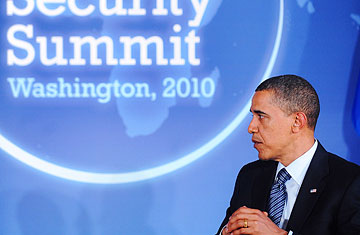
President Obama at Blair House in Washington on April 11, 2010
Ask an Obama Administration official why the President is bringing nearly 50 heads of state all the way to Washington just so they can collectively declare that loose nukes are bad, and you'll get a version of this: America can only be safe if international cooperation is strong.
That may be true, and hawks and doves in Washington agree there's little downside to the summit itself. But even the most idealistic internationalists know that the number of nuclear-armed states is likely to grow rather than shrink in coming years, weakening the Nuclear Non-Proliferation Treaty (NPT) and increasing the production of dangerous materials around the globe. So, a more accurate definition of the summit's purpose may be that it is, at best, a small step toward slowing the decline of international cooperation on nuclear issues.
The gathering will produce more paper than progress, Administration officials concede. There will be the nonbinding communiqué, wherein the leaders will declare the dangers of nuclear proliferation. They will pledge to take new national and international measures to secure nuclear materials within four years. The summit will produce a "work plan" of steps that individual states will take to secure their nuclear materials; that too will be nonbinding. And individual countries will announce their own measures, to the extent that they want to do more.
Such limited achievements are not without value. Since 2004, U.S. leaders of all stripes have agreed that the greatest threat to American security is the possibility of terrorists acquiring a nuclear weapon. The only plausible way that could happen is if a group could steal or buy uranium or plutonium from an existing store, and there are many poorly guarded stocks of uranium and plutonium around the world.
Even the most hawkish members of the previous Administration support promoting cooperation to keep nuclear materials safe. The Obama Administration says that just getting so many heads of state to sit down and discuss the issue is an achievement. "The fact that almost 50 countries are coming to Washington, most heads of state, heads of government level, is indicative of the response that these countries are paying to this very important subject," says Obama's National Security Adviser, General James Jones.
But some countries have been more supportive in spirit than in fact. Many countries participating in the summit have concluded that tightening security measures around their nuclear material is not worth the cost and effort. "There's disagreement over how much physical security is needed," says David Albright of the Institute for Science and International Security, adding that Russia, India and some European countries have been skeptical of the extent of the danger posed by nuclear terrorism.
Convincing skeptics to make the necessary investment requires building credibility for international confabs like the one in Washington. But multilateral international institutions are not exactly dominating the strategic scene at the moment: the Bush Administration degraded them during its first term. Obama made reversing that approach a cornerstone of his campaign and his presidency. The reality is that neither Bush's unilateralism nor Obama's internationalism has slowed Iran's and North Korea's nuclear programs, nor have they halted the expansion of peaceful nuclear programs elsewhere around the world.
The Obama Administration counters that this week's summit is just one part of a larger strategy. It coincides with the release of the Administration's new, less aggressive nuclear posture and the signing of a new nuclear-arms-reduction treaty with Russia; it will be followed next month by the 10-year review conference of the NPT at the U.N. "The President has put this complicated interrelated strategy together," says a senior Administration official. "We're beginning to execute on the commitments [announced by the President a year ago in his speech in Prague]. Things are falling into place, and the President is showing leadership in arms control."
When the leaders gathered this week reconvene in 2012 to assess the progress on controlling loose nukes, Americans will judge for themselves whether the effort to contain loose nukes goes beyond symbolic declarations.
